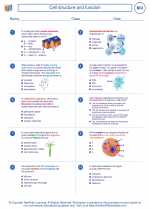Cell structure and function -> eukaryotic cells
Eukaryotic Cells
Eukaryotic cells are the building blocks of all multicellular organisms, including plants, animals, fungi, and protists. These cells are defined by the presence of a true nucleus, as well as other membrane-bound organelles. The presence of these organelles allows for compartmentalization of cellular processes, enabling eukaryotic cells to perform a wide range of functions.
Key Features of Eukaryotic Cells
- Nucleus: Contains the cell's genetic material (DNA) and is enclosed by a nuclear envelope.
- Membrane-bound organelles: Including mitochondria, endoplasmic reticulum, Golgi apparatus, lysosomes, and others.
- Cytoskeleton: Provides structural support and facilitates cell movement and division.
- Cell membrane: Surrounds the cell, regulating the passage of materials into and out of the cell.
- Cytoplasm: Contains various organelles and is the site of many cellular processes.
Functions of Eukaryotic Cells
Eukaryotic cells carry out a wide range of functions, including:
- Energy production: Mitochondria are responsible for generating energy in the form of ATP through cellular respiration.
- Protein synthesis: The endoplasmic reticulum and ribosomes work together to produce proteins for various cellular functions.
- Storage and recycling: Lysosomes break down waste materials, while the endoplasmic reticulum and Golgi apparatus are involved in processing and packaging molecules.
- Cellular communication: Cell membranes facilitate communication with the external environment and neighboring cells.
- Reproduction: Eukaryotic cells can undergo mitosis for growth and repair, as well as meiosis for sexual reproduction.
Studying Eukaryotic Cells
When studying eukaryotic cells, it's important to understand the structure and function of each organelle, as well as the processes that occur within the cell. Key topics to focus on include:
- Organelle structure and function
- Cell membrane composition and function
- Cytoskeletal elements and their roles
- Cellular processes such as respiration, protein synthesis, and cell division
- Comparisons with prokaryotic cells
Additionally, hands-on activities such as cell staining and microscopy can provide valuable insights into the characteristics of eukaryotic cells.
By mastering the intricacies of eukaryotic cells, students can gain a deeper understanding of the fundamental unit of life and the basis of complex biological systems.
.◂Biology Worksheets and Study Guides High School. Cell structure and function

 Worksheet/Answer key
Worksheet/Answer key
 Worksheet/Answer key
Worksheet/Answer key
 Vocabulary/Answer key
Vocabulary/Answer key
 Vocabulary/Answer key
Vocabulary/Answer key
 Vocabulary/Answer key
Vocabulary/Answer key
 Vocabulary/Answer key
Vocabulary/Answer key
 Vocabulary/Answer key
Vocabulary/Answer key
